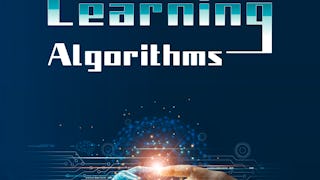- Browse
- Food Science
Results for "food science"
 Status: PreviewPreviewT
Status: PreviewPreviewTTechnion - Israel Institute of Technology
Skills you'll gain: Materials science, Medical Devices, Biomedical Engineering, Emerging Technologies, Electronics Engineering, Chemistry, Chemical Engineering, Manufacturing Processes, Biochemistry, Creative Design
4.2·Rating, 4.2 out of 5 stars27 reviewsMixed · Course · 1 - 3 Months
 Status: PreviewPreviewS
Status: PreviewPreviewSSungkyunkwan University
Skills you'll gain: Machine Learning Algorithms, Decision Tree Learning, Classification Algorithms, Unsupervised Learning, Machine Learning, Supervised Learning, Python Programming, Algorithms, Bayesian Statistics, Probability & Statistics
3.5·Rating, 3.5 out of 5 stars8 reviewsMixed · Course · 1 - 4 Weeks
 Status: Free TrialFree TrialU
Status: Free TrialFree TrialUUniversity of California San Diego
Skills you'll gain: Software Design Documents, System Design and Implementation, Internet Of Things, Technical Documentation, Technical Communication, Mobile Development, Test Case, System Testing, Software Development, Wireless Networks, Embedded Systems, Systems Integration
4.8·Rating, 4.8 out of 5 stars13 reviewsMixed · Course · 1 - 4 Weeks
 Status: NewNewStatus: Free TrialFree Trial
Status: NewNewStatus: Free TrialFree TrialSkills you'll gain: Pandas (Python Package), Pivot Tables And Charts, Data Manipulation, Time Series Analysis and Forecasting, Data Import/Export, Jupyter, Microsoft Excel, Data Transformation, Matplotlib, Data Analysis, NumPy, Data Cleansing, Data Preprocessing
Mixed · Course · 1 - 4 Weeks
 Status: Free TrialFree Trial
Status: Free TrialFree TrialSkills you'll gain: Looker (Software), Pivot Tables And Charts, Dashboard, Data Modeling, Exploratory Data Analysis, Data Analysis, Query Languages
Beginner · Project · Less Than 2 Hours
 Status: Free TrialFree Trial
Status: Free TrialFree TrialSkills you'll gain: Logo Design, Adobe Illustrator, Presentations, Typography, Graphic Design, Animations, Adobe After Effects, Motion Graphics, Adobe Creative Cloud, Branding, Brand Strategy, Marketing Design, System Configuration, Brainstorming, Intellectual Property, Design Software, Knowledge of Apple Hardware, Creative Design, Strategic Thinking, Legal Risk
4.8·Rating, 4.8 out of 5 stars8 reviewsBeginner · Specialization · 3 - 6 Months
 Status: Free TrialFree TrialI
Status: Free TrialFree TrialIIllinois Tech
Skills you'll gain: Database Design, Relational Databases, Database Theory, Database Development, Database Systems, Data Modeling, Unified Modeling Language, Database Architecture and Administration, Database Management, Databases, Data Integrity, Data Dictionary, Diagram Design, Functional Requirement, Dependency Analysis, Conceptual Design, Design Strategies, Requirements Analysis
Build toward a degree
3.8·Rating, 3.8 out of 5 stars14 reviewsBeginner · Course · 1 - 4 Weeks
 Status: Free TrialFree Trial
Status: Free TrialFree TrialSkills you'll gain: Waste Minimization, Environmental Engineering, Sustainable Engineering, Civil Engineering, Environmental Regulations, Sustainable Technologies, Environmental Resource Management, Environmental Laws, Environmental Policy, Transportation Operations, Traffic Flow Optimization, Estimation, Network Routing
4.6·Rating, 4.6 out of 5 stars12 reviewsIntermediate · Course · 1 - 4 Weeks

Skills you'll gain: Blockchain, Application Deployment, Integrated Development Environments, Development Testing, Application Development, Web Applications, Javascript
4·Rating, 4 out of 5 stars6 reviewsBeginner · Guided Project · Less Than 2 Hours
 Status: Free TrialFree Trial
Status: Free TrialFree TrialSkills you'll gain: Figma (Design Software), Animations, Responsive Web Design, Prototyping, UI Components, Interaction Design, Mockups, User Experience Design, User Interface (UI) Design, User Flows, Collaborative Software
Mixed · Course · 1 - 3 Months
 Status: Free TrialFree Trial
Status: Free TrialFree TrialSkills you'll gain: Sales Development, Customer Engagement, Responsible AI, Lead Generation, Sales Enablement, Generative AI Agents, Sales Management, Customer experience improvement, Sales Prospecting, Productivity Software, Sales, Data Ethics
Intermediate · Course · 1 - 4 Weeks
 Status: Free TrialFree TrialC
Status: Free TrialFree TrialCCoursera
Skills you'll gain: Generative AI, Customer Insights, AI Personalization, Customer Analysis, ChatGPT, Customer experience strategy (CX), Real Time Data, Design Thinking, Artificial Intelligence, Analysis, Design
Intermediate · Course · 1 - 4 Weeks
Searches related to food science
In summary, here are 10 of our most popular food science courses
- التقانة والمستشعرات النانوية - الجزء الاول: Technion - Israel Institute of Technology
- Machine Learning Algorithms: Sungkyunkwan University
- Internet of Things Capstone V2: Build a Mobile Surveillance System: University of California San Diego
- Pandas with Python: Analyze, Transform & Export Data: EDUCBA
- Creating a Looker Modeled Query and Working with Quick Start: Google Cloud
- Logo Design: From Concept to Client-Approved Work: Skillshare
- Relational Database Design: Illinois Tech
- Solid Waste Collection, Storage and Transportation: L&T EduTech
- Solidity for Beginners: Write and Test Smart Contracts: Coursera
- Figma UI UX Design Essentials Pt.3: Prototypes & Handoff: Skillshare










